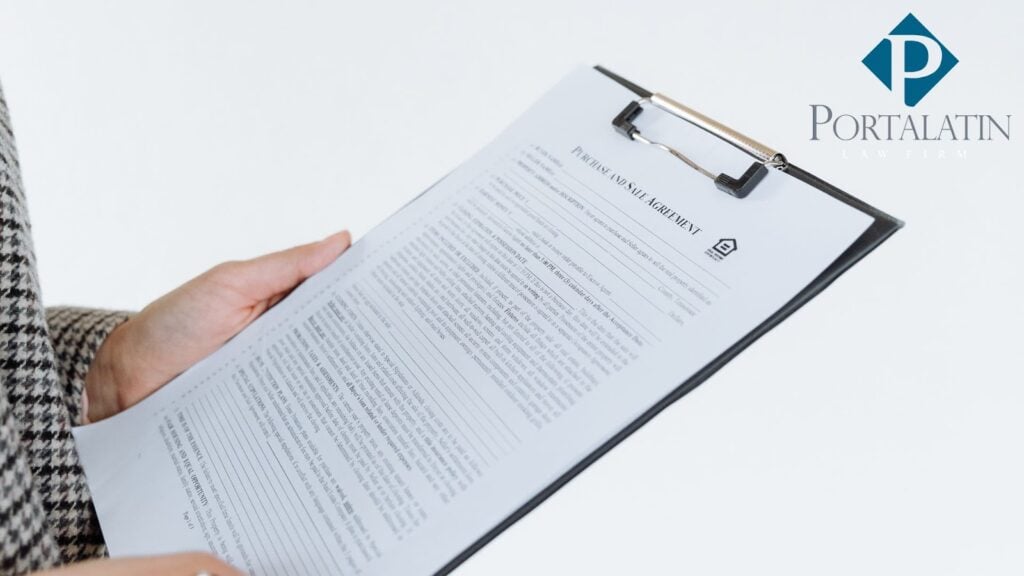Boilerplate clauses are standard provisions found in most business contracts and are often overlooked as routine and non-negotiable. However, these clauses play an important role in defining rights and obligations, and in some cases, they may be drafted to favor one party over another.
According to the World Commerce and Contracting Association, 90% of business professionals find contracts hard to understand. That is why it is important to carefully review and comprehend these provisions before signing a contract.
At Portalatin Business Law Firm, we help entrepreneurs and business owners cut through the legal jargon and build strong, future-proof businesses. Unlike traditional firms, we proactively protect companies instead of just reacting when problems arise.
Key Takeaways
- Boilerplate clauses are standard provisions in contracts that define terms and enforceability. They are usually found towards the end of an agreement.
- Common examples include waiver, assignment, entire agreement, choice of la. and force majeure clauses.
- They provide consistency, make contract creation smooth, and help protect legal rights.
- Reviewing them carefully and consulting a legal professional can help manage risks.
What is a Boilerplate Clause?
A boilerplate clause is a standard provision found towards the end of most contracts, covering a variety of technicalities that can affect the enforceability of the contract. These clauses appear in various contracts, including employment agreements, NDAs, and licensing contracts, playing an important role in defining obligations and expectations.
Understanding these clauses allows you to avoid unexpected legal ramifications. Given their significance, having a contract lawyer review boilerplate clauses can help to provide guidance and allow for legal compliance.
10 Common Types of Boilerplate Clauses in Contracts
Here are the common types of boilerplate clauses:
1. Indemnification Clause
An indemnification, sometimes referred to as a “hold harmless” clause, is an agreement where one party (the indemnifying party) promises to compensate the other party (the indemnified party) for any losses or damages arising from a specific event or circumstance. Indemnification can also be mutual.
2. Entire Agreement Clause
An Entire Agreement clause, also known as a merger or integration clause, is a contractual provision stating that the written contract represents the complete and final understanding between the parties, superseding all prior or contemporaneous agreements or representation.
3. Choice Of Law Clause
A choice of law provision determines which state’s laws and legal rules will be applied when interpreting the contract in the event of a dispute or lawsuit, particularly in cases of contract breach. The parties must decide which state’s laws apply, especially if they are located in different states.
Since laws vary by region, a party may want to choose a clause that benefits them, but the states involved must have a connection to the parties or their business.
4. Jurisdiction Clause
A jurisdiction clause determines where a lawsuit must be filed, specifying the state and county in the event of a contract breach. If a region is chosen where neither party operates, there must be a relevant connection and reason for selecting that location.
5. Notice Clause
The notice clause specifies the manner in which notices must be delivered between the two parties. It is linked to many other clauses, as proper notification is required for actions like terminating the contract.
6. Non-Waiver Clause
A non-waiver clause, also known as a “no waiver” clause, is a contractual provision that prevents a party from unintentionally waiving their rights or obligations under the contract due to inaction or failure to enforce a term. It states how a waiver must occur to be enforceable, which is usually in writing from the party waiving the right.
7. Arbitration Clause
Arbitration, the most commonly used dispute resolution method, involves settling a legal matter outside of court with the help of a third party arbitrator who determines the resolution. This provision could specify that any dispute will be settled by arbitration or outline whether the decision of the arbitrator will be binding.
8. Force Majeure Clause
Known as “force majeure,” which translates to “superior force” from French, this provision exempts parties from adhering to the contract when an unforeseen trigger event radically changes circumstances. These events, often referred to as “Acts of God,” include many types of natural disasters.
9. Assignment Clause
This clause affects the ability of one or both parties to transfer their rights and/or obligations under the agreement to a third party.
10. Amendments Clause
The clause specifies the conditions under which the contract or certain terms can be altered. Usually, both parties must provide written confirmation of their consent to amend the agreement.
Why Are Boilerplate Clauses Important in Modern Contract Law?

Boilerplate clauses are important in modern contract law due to their role in standardizing terms, minimizing ambiguity and potential disputes.
They also have large financial and legal implications, guide parties and courts in dispute resolution, make the contract drafting process more efficient, and prevent detrimental outcomes due to oversight.
Pros and Cons of Using Boilerplate Clauses
Here are the pros and cons of using boilerplate clauses:
Pros Of Using Boilerplate Clauses
Boilerplate clauses offer advantages including:
- Risk reduction, foreseeing common/potential future disputes
- Default contract procedures
- Reliable enforcement of terms
- Reusability across contracts
Cons Of Using Boilerplate Clauses
Boilerplate clauses can have disadvantages including:
- Lack of Customization: Generic terms may not fit specific needs.
- Overreliance: Parties may agree to unfavorable terms without understanding them.
- Unbalanced Negotiations: Can favor one party over the other.
- Inconsistent Application: May conflict with other provisions in the contract.
Secure Your Business with Confidence
Understanding boilerplate clauses can be a game-changer for protecting your business and avoiding legal headaches. These standard contract provisions may seem routine, but they can have real consequences if they’re not carefully reviewed and tailored to your needs.
At Portalatin Business Law Firm, we help businesses prevent legal issues for businesses. If you’re ready to protect your business and strengthen your contracts, contact us today and get the legal guidance that keeps your business secure and ready for growth.


